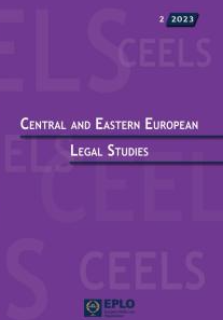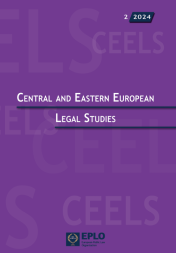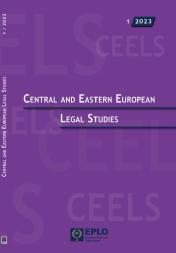
Central and Eastern European Legal Studies 2/2023
The first paper in the Central and Eastern European Legal Studies – CEELS 2/2023 deals with the topic of implementation and protection of human rights and more in particular the legislative and institutional framework of the human rights agenda in the Slovak Republic, whose independence was established in 1993. The effort is to open a discussion about priorities and roles in the field of human rights after almost 20 years of membership of the Slovak Republic in the EU. The contribution mainly concerns the years 2020 to 2022 and shows how the principles of human rights protection are applied in Slovakia and what practical problems can arise in their observance in a relatively young democratic country in Central Europe.
The next paper deals with Ukraine’s economic integration into the European Union (EU) as a key development area that not only determines the country’s future, but also has a profound impact on its economic, political, and socio-cultural dynamics. It emphasizes that, by embarking on the association process with the EU, Ukraine has recognized that economic integration is an important strategic goal that opens up new opportunities and challenges. This becoming an important subject of research and discussion at both the national and international levels, it is important to consider not only the positive aspects, but also the challenges and risks that arise in the process of economic integration. This article aims to explore these issues by focusing on the key aspects of Ukraine’s economic integration with the EU.
The topic dealt with in the third paper of this issue, that is the domestic mechanisms for regulating sanctions, considered as one of the types of non-pecuniary liability, represents an important aspect of the modern legal system. The central idea is that sanctions are a means not only to punish violators, but also to encourage accountability and prevent future offenses. In studying the domestic mechanisms of their application, the first thing to consider is the legal framework while the second aspect is the mechanisms of sanctions enforcement. Finally, it is important to consider sanctions as an instrument of social influence.
The fourth paper of the issue deals with the topic of Artificial Intelligence. In recent years, at the level of the European Union, at the level of the member states and at the global level, the implications that AI systems will have on fundamental rights, the extent to which these systems can cause harm to the people who use them, but also the forms of special liability that will apply in the case of harm caused by AI systems are being discussed more and more often. The paper intends to analyze the legislative progress made in the year 2023, with a careful look at generative Artificial Intelligence and with the analysis of existing vulnerabilities in the analyzed field.
The next paper, by maintaining that the serious environmental challenges that humankind is facing can only be addressed and overcome through international cooperation and the creation of an appropriate legal framework that is compatible with EU legislation and in line with European best practices, deals more in particular with the approximation process with the EU environmental acquis in Georgia started directly after the signing of the “Association Agreement between the European Union and the European Atomic Energy Community and their Member States, of the one part, and Georgia, of the other part”, which is an obligation of the said EU-Georgia Association Agreement. In this article, is discussed the way of transforming the Georgian environmental legislation after the entry into force of the Association Agreement, the challenges that exist in the process of legislative approximation in the environmental direction are identified, and the authors’ recommendations in order to overcome the mentioned challenges are presented.
Last but not least, the final article in this issue aims at examining marine environmental protection under the regime of the 1982 Law of the Sea (UNCLOS) with special reference to provisional measures of protection provided both in the 1982 UNCLOS and the Statute and Rules of the International Tribunal for the Law of the Sea (ITLOS). Furthermore, the 1995 UN Fish Stocks Agreement (FSA), including its conservation and dispute settlement regimes, and the Permanent Court of Arbitration (PCA) Optional Environmental Arbitration Rules (OEAR) of 2001 and 2010 are examined.
Summary
Ľ. Malíková / M. Daško, Human Rights Promotion and Protection in Slovakia [IN ENGLISH] (20 pp.)
Y. S. Matiieva, Economic Prospects for Ukraine’s Integration into the EU [IN ENGLISH] (16 pp.)
V. S. Mulyavka / G. A. Bialyi, Domestic Mechanisms for Regulating Sanctions as One of the Types of Non-pecuniary Liability [IN ENGLISH] (18 pp.)
P.-E. Ispas, Artificial Intelligence: New Challenges [IN ENGLISH] (16 pp.)
P. Turava / G. Varamashvili, The Impact of EU-Georgia Association Agreement on Georgian Environmental Legislation [IN ENGLISH] (22 pp.)
M. Semih Gemalmaz, The Law of the Sea and Environmental Protection, with Special Reference to Provisional Measures of Protection [IN ENGLISH] (94 pp.)





















